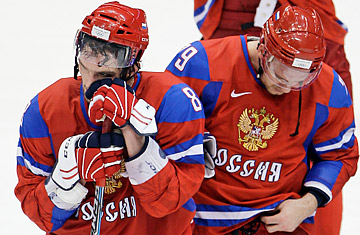
Russian hockey players Alexander Ovechkin and Andrei Markov, after their 7-3 loss to Canada in the men's quarterfinals of the Olympics
After the much-vaunted Russian hockey team was embarrassed by a 7-3 loss to Canada in the quarterfinals of the Vancouver Olympics, head coach Vyacheslav Bykov predicted the reaction the team would receive back home. "Let's put guillotines and scaffolds up on Red Square. We have 35 people in the squad — let's finish them all off," he told reporters. Unlike his team's shooting on Wednesday night, he was spot-on. "If you were asleep, you were lucky," cried the headline of the Sport Express daily on Friday. The state news agency RIA Novosti put it more succinctly: "Nightmare in Vancouver."
The defeat was widely seen as the final humiliation for a Russian Olympic team that has struggled to live up to expectations, finishing in sixth place on the medals table, with only three golds — half the number won by South Korea. Not only did the Russians not medal in hockey, but for the first time since 1964, the Russian national anthem (which is the same as the Soviet one) was not heard at the figure-skating rink — a travesty for a nation with a glorious figure-skating history. It's been a startling decline from the days of Soviet domination: from 1956 to 1991, when the Soviet Union dissolved, the country topped the medals table at all but two Winter Olympics. Its best showing was in 1988, when it won 29 medals, including 11 gold.
Russian politicians and commentators are now calling for heads to roll. Boris Gryzlov, the parliamentary speaker and a senior member of Prime Minister Vladimir Putin's ruling United Russia Party, says he will summon Russian Sports Minister Vitaly Mutko and the head of the Olympic committee to explain the country's meek performance. "The current state of Russian sports causes bitterness and offense among all Russian citizens," bemoaned Igor Lebedev, a lawmaker from a nationalist party.
For Russians, sports have always been an immense source of national pride. In the Soviet Union, a combination of generous funding and a powerful sports infrastructure nurtured athletes, whose triumphs could then serve as evidence of the superiority of the communist system. Even following the disintegration of the Soviet Union, sports remained a way for the new Russian state to project its power. The international success of the Russian soccer and hockey teams in recent years was trumpeted as a sign the country had been resurrected under new leadership to be a global force again.
The poor showing in Vancouver couldn't come at a worse time, with the economy having contracted 8% last year, following years of rapid growth. "[Sporting success] is very important as an instrument of legitimacy for the political regime," says Andrei Ryabov, a political analyst at the Moscow Carnegie Center. "When the economy is struggling, it's better to focus people on how great the country is rather than thinking about problems in economic and social policies. But that hasn't happened." The struggles are augmented by the fact that Russia is set to host the next Winter Olympics, in 2014 in Sochi.
One response has been to blame others. When Russian figure skater Evgeni Plushenko finished second to American Evan Lysacek in the men's competition, some officials in his homeland sensed a plot. "Everyone knows that Canada is a U.S. colony and all the [Olympic] judges are under the White House's thumb," fumed Sergei Malinkovich, head of St. Petersburg's Communist Party. Putin was somewhat more diplomatic in a telegram to Plushenko. "Your silver is worth a gold," he wrote.
But the Russian leadership has only itself to blame for the collapse of the mighty Soviet sports machine. When the Soviet Union dissolved, the funding for sports largely dried up and athletes couldn't rely on the same level of support they had before. Many went abroad, taking their coaches with them. Russian-born biathlete Anastasia Kuzmina left the country after the national sports federation stopped backing her when she got pregnant; the Russians no longer viewed her as a medal contender. She went on to win a gold and silver for Slovakia in Vancouver.
"The current situation is a consequence of what we lost in the 1990s," Sports Minister Mutko told RIA Novosti this week. Financing has risen again under the leadership of sports-fan Putin, but as Mutko notes, "You can't prepare a top-level athlete in an hour."
Many see the failures in Vancouver as symptoms of a wider issue. Former Russian athletes have complained that the country's sports federations are plagued by the same problems affecting other state structures — namely, corruption and cronyism. Ryabov says a lack of a functioning infrastructure is hampering sports the same way it is dragging down the economy. "[Political leaders] prefer to take a narrow approach, investing in a few national champions rather than the whole team and the program," he says, comparing the approach to the government's attempts to modernize the Russian economy by promoting massive, state-owned corporations but not creating the conditions for small- and medium-size businesses to prosper.
Russia has a short amount of time to turn the ship around before the Sochi Games. Putin made it his mission to secure the Olympics for Russia — and he will be keen to see his teams do well. "A lot of money, hopes and expectations have been invested in the Sochi Olympics," hockey legend and former Sports Minister Vyacheslav Fetisov told the Komsomolskaya Pravda daily this week. "We don't have the right to lose at home."
